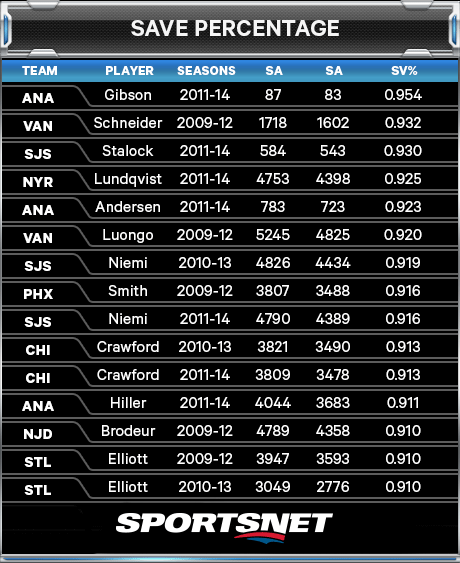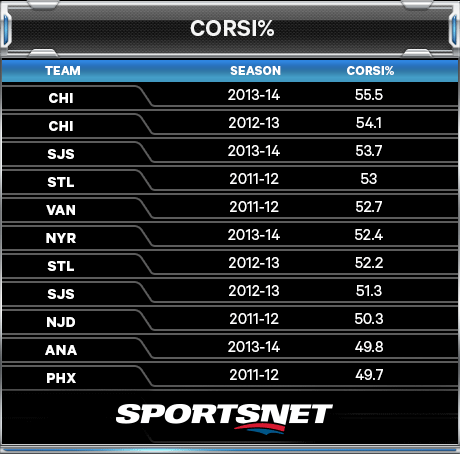On a certain level, predicting sports outcomes is a pretty silly, futile thing. It’s rare in today’s NHL that you get a matchup where one team has a better than 60 percent shot at winning a game. If I told you I had a pretty good sense that a coin was going to come up heads, you’d laugh at me. If a respected hockey commentator tells you that he thinks Los Angeles is going to win the series, you may well take note of it. Given the odds involved with hockey games generally (and between two closely matched teams in particular), predicting a series has only slightly more utility than predicting a coin flip.
Despite that, predictions are still a big part of the hype in the playoffs. But people are irrational; I find it more interesting to use data to try to identify cases in which public sentiment about something is incorrect. This Stanley Cup final seems to me like it’s probably one of those cases.
One of the best ways to identify public sentiment about something is through betting odds. Bookies are trying to get the same money on each side of the line, so you can draw an inference about what the public thinks is likely to happen from the odds. As of Monday afternoon, bettors seemed to think that the Kings have about a 61 percent chance to win the Stanley Cup, meaning the Rangers sit at 39 percent.
This seems to me like it’s underrating the Rangers to a degree. You can do a little math (I’ll spare you the details) and, ignoring the home-ice effect (which tilts things a bit towards Los Angeles), you come up with the betting public thinking that the Kings have about a 55 percent chance of winning a given game against the Rangers.
Does this seem reasonable to you? A way of expressing the gap that the betting public suggests is to think of an 82-game season in which Los Angeles and the Rangers played each other exclusively. If the betting public is right, we’d expect L.A. to take about 91 points in regulation with the Rangers taking 73. To give that some context, the average team loses 10 times a year in overtime or the shootout, so call it 101 points for L.A. and 83 for New York.
L.A. finished 100 points this season, New York 96. I’m willing to believe that a season-long diet of Los Angeles would have seen the Rangers earn fewer points. I have considerable doubt that Los Angeles would have put up more points with a season’s worth of games against the Rangers than they did with a standard schedule.
In other words, I think that this series is closer than the betting markets seem to think. Why? Two things jump out at me as I look over the data.
1. Henrik Lundqvist is the best goalie the Kings have faced in the playoffs since their run started in 2012.
One of the oddities of the Kings’ past three playoffs is that they haven’t really faced a goalie other than Roberto Luongo with any sort of a claim to being elite. A year of data doesn’t really tell us enough about goalies, so I’ve gathered the save percentage numbers for the three years preceding each series in which the goalie played.

If you ignore the small-sample guys, Lundqvist is, by some distance, the best goalie the Kings have seen. This group collectively averaged a .915; Lundqvist has put up a .925 over the past three years.
2. New York is a very good possession team
It’s no secret that Los Angeles is an elite possession team. They’re almost certainly going to out-shoot the Rangers at 5-on-5 in this series. What’s maybe a little less well known is that New York is also a very good possession team, falling into about the middle of the teams that the Kings have played in the playoffs over the past three years.

Like everyone in the Eastern Conference this season, the Rangers played a pretty soft schedule. That being said, they held their own against the Western Conference with a 51.3 percent Corsi%. Perhaps their most impressive accomplishment is being one of only two teams to win the 5v5 shot-attempt battle in a game against the Kings in Los Angeles. More impressively, the Rangers won the game—it’s harder to put up a big Corsi% in a game that you win because teams sit back with the lead.
If the Rangers do win the Cup, it will likely be thanks to some combination of these two things and special teams that are responsible. While I think Los Angeles is more likely to win, it’s close enough that it’s pretty easy to see New York winning. They were a popular dark horse amongst analytics people when the playoffs started—not unlike the 2011-12 Los Angeles Kings—and they’re legitimately a very good team.

